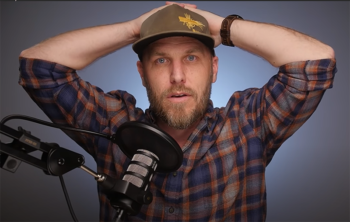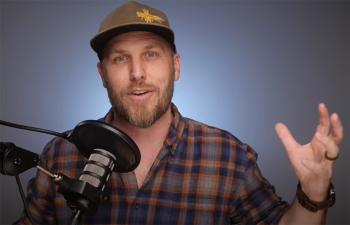 By Luke Mammana —
By Luke Mammana —
For almost half his life, Matt Whitman lived off of the faith he found in Christ at age 15. But at age 29, after a falling out in his church, he decided that none of it made sense anymore and he became an atheist.
“I went from being in a Christian home and being a Christian as a young person to having my faith fall apart completely in adulthood,” he says on a Ten Minute Bible Hour video on YouTube.
Matt documents his own “spiritual deconstruction” to counter an emerging trend on YouTube of former Christians posting “anti-testimonies.” They explain how “reason” made them doubt and abandon their faith. Included are Hillsong song-writer Marty Sampson, “I Kissed Dating Goodbye” author Joshua Harris and singer Lisa Gungor, who “anti-testified: on Buzzfeed.
 Matt Whitman was raised in a household where they discussed theology, history, philosophy and art. His dad was a pastor, and home life in Fort Collins, Colorado, was nothing but enjoyable.
Matt Whitman was raised in a household where they discussed theology, history, philosophy and art. His dad was a pastor, and home life in Fort Collins, Colorado, was nothing but enjoyable.
“We did ‘thought’ for fun growing up,” he remembers. “We talked about books and movies and music and stories. I loved it. It was a blast to process all this. Through and in that context, the basics of the Christian concept made sense, and I signed up.”
He was 15 when he completed “Christianity 101,” gaining an understanding of some of the fundamentals of faith like God’s eternal nature.
“I got a lot of applause for being a good Christian young man,” he recalls. “I got a Christian job at the Christian bookstore. I went to a Christian high school. I got an award there for being a good Christian or whatnot. I felt like I had arrived.”
But his young mind had fixed mostly on behaving well to earn people’s admiration, which is a “pretty ugly build of faith to take out of childhood,” he says.
 “Sure enough, I crashed against the rocks,” he explains. “The wheels fell off.”
“Sure enough, I crashed against the rocks,” he explains. “The wheels fell off.”
As he grew up, got married, became a leader in the church, the simplistic answers of his childhood faith never got updated and were inadequate for the interpersonal relationship struggles and daunting philosophical questions presented to his maturing mind.
At age 29, he was driving away in a moving van with his young wife and weeks-old daughter from a church where he worked after “stuff got weird.” He never wanted to work at a church again and had nowhere to go.
“I started crying — like ugly crying,” he says. “Part of the reason is because that was the time that I wanted to have everything together for (my family),” he says. “I didn’t want there to not be a God, but I really felt there was no God.”
But in all honesty, his faith had vanished. “On that drive I kept coming to the conclusion that it was all fake,” he says.
 Months later, he decided to re-read the Bible before he shared his atheism with his wife. But this time he vowed to read the Bible with an open and critical mind. He decided to jettison any and all delusions and break past his once infantile faith.
Months later, he decided to re-read the Bible before he shared his atheism with his wife. But this time he vowed to read the Bible with an open and critical mind. He decided to jettison any and all delusions and break past his once infantile faith.
Viewed with fresh eyes, what he saw in the Bible shattered his preconceived notions.
“Very quickly I realized, ‘Oh, I have a false assumption here. My false assumption was that I was the main character of the document, that humans were the point’ but we’re not,” he says. “God is clearly the main character of the document.”
Whoa! Mind-blown.
“That changes everything,” he marvels. “I got to run everything through that new matrix. How does this work?”
His “Christianity” of trying to behave well to impress others subsequently crumbled. God was no longer subservient to man.
The Bible “is the story of God redeeming things that are broken and messed up — people, creation, everything,” he says.
Surprise, surprise. His version of Christianity from when he was 15 didn’t hold water.
“I was raised around Christianity. I was very proud of that. I had a version of it that I built when I was 15 that I carried into adulthood. I refused to grow, and it broke. It’s not anybody else’s fault,” he says. “Somehow it came all back together, and it looks very, very different.”
Unlike those who proudly proclaim their newfound atheism, Matt says he’s glad he didn’t set his flag down on unbelief with an anti-testimony because things were still “in process.” He was being authentic with his thinking, but he didn’t set down a false foundation after he walked away from faith.
He still doesn’t have everything figured out, he says. But he likes to think and re-think. If the wheels once came off and the whole vehicle of faith came apart, he reassembled it with news on the Scriptures. He continues to work on that vehicle. He spreads the parts out of his workbench and continues to tinker with doctrines to try to understand elements of the Bible.
Matt is unafraid of questioning.
“I don’t believe something just to make myself feel better,” he says. “This makes for a weird, clumsy, clunky, uncomfortable version of Christianity. But it feels like I’m telling myself the truth. Maybe I’m not right about everything, but at least I’m not intentionally lying to myself.”
So for Matt, doubts and questions are not the problem. They don’t undercut faith; they deepen faith. The thinking person should pursue any and all questions and not force himself to fit into any framework of thinking, whether it be dogmatic religiosity or dogmatic atheism.
You can’t reduce God to a compendium of “exhaustive theology.” You must always be ready to explore the mystery of God and never think you have Him fully figured out. No formula or catechism can fully capture the portrait of God.
“This is a lifelong adventure of exploring the final frontier, the depths of the human soul, of eternity, of God, of life and death, of everything,” he says. “Get ready for a crazy, interesting, fascinating ride. This will be the most interesting project of your life.”
If you want to know more about a personal relationship with God, go here
Luke Mammana studies at the Lighthouse Christian Academy of Santa Monica.




Atheists are not “apostates” who proudly proclaim their rejection of God. This story is a testament to that… Be careful who you judge. Everyone is dealing with pain and hurt and God is well aware.
I take your point…the story has been edited because the word apostate is perhaps too strong and carries a historical weight that some, like yourself, will consider judgmental.
Comments are closed.